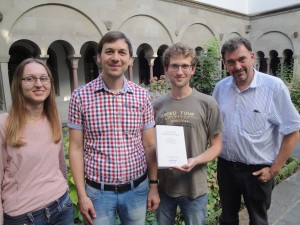A Zwingli for our own day?
A couple of months ago, Mohr Siebeck published the 800pp-volume God and the Faithfulness of Paul in the WUNT II series. As the title indicates and the subtitle clarifies, this work is “A Critical Examination of the Pauline Theology of N. T. Wright.” Over 30 scholars participate in this examination and N. T. Wright himself responds to them in a concluding essay. (You can access the TOC here.) Todd Scacewater at Exegetical Tools has called this the “most comprehensive critique” of Wright “nearly a must-have” and “a most important book to own” concluding that for Pauline scholars “it would be irresponsible not to own this volume.” We agree, of course, with this assessment and want to offer in this blog post a glimpse at what one can expect from this volume by presenting the essays written by Zurich scholars in some detail. (On the essays by scholars from the German-speaking sphere in general, see Wayne Coppins’ review on his blog Germanforneutestamentler).
At least with regard to page count, these chapters can be regarded as offering quite a good impression of the volume, given that they make up almost 1/5 of the book.
Further, I am confident that they are also representative of the volume as a whole in another regard, namely in the way it tackles specific issues of Wright’s big work – in a friendly but critical manner, and offering not only a discussion of Wright’s contribution to a specific field but also an introduction into the current state of research on this aspects, thus offering an ideal point of departure for young researchers who want to dive into specific methodological, exegetical, and theological issues.
Benjamin Schliesser: Paul and the Faithfulness among Pauline Theologies
In this first part of the series “Zurich on N. T. Wright” (for Part 2, click here), we will take a look at Benjamin Schliesser’s overview article, which starts our endeavor in GFP by locating Paul and the Faithfulness of God “among Pauline theologies” (GFP 21).
He begins (GFP 21-22) by noting that PFG has been associated with a plethora of superlatives by other scholars. Against this backdrop, Schliesser intends “to place Wright’s magnificent monument in the landscape of Pauline scholarship, next to other such monuments, with the goal of comparing major features of their surface and deep structures” (GFP 22). Before approaching recent Pauline theologies (by James Dunn, Thomas Schreiner, Michael Wolter, and Udo Schnelle), Schliesser begins by discussing PFG in relation to the work of Rudolf Bultmann (GFP 22-33). Interestingly, he not only notices contrasts but also identifies confluences and criticizes Wright’s depiction of Bultmann as a negative foil to his own approach in certain regards.
By the way, if you are interested in the idea of Wright as a kind of “Bultmann for our own age,” you should also compare what Oda Wischmeyer (GFP 89), Eve-Marie Becker (GFP 152), and Jörg Frey (GFP 497-498; see also part 3 of this series) have to say with regard to this characterization by Daniel Boyarin (PFG i).
Be that as it may, Schliesser continues by offering a short synthetic treatment of “Form, Style, and Design” (GFP 31-38) of the different Pauline theologies and then addresses them individually as dialogue partners to Wright’s PFG. The following areas are discussed:
James Dunn and N. T. Wright (GFP 38-46)
- Paul as a Jewish-“Nazarene” Theologizer
- Two “New Perspectives” on Paul
- The Grand Narrative – an “Ideé fixe”?
- “Christological Monotheism”
Thomas Schreiner and N. T. Wright (GFP 46-53)
- Paul as a Preacher of God’s Saving Righteousness
- Justification and Transformation
- Human Plight and Divine Solution
Michael Wolter and N. T. Wright (GFP 53-58)
- Paul as an Inventor of Christian Identity
- Christ-Faith and Christ’s Faith
- Justification – an “Ecclesiological Doctrine”
Udo Schnelle and N. T. Wright (GFP 53-64)
- Paul as a Versatile Cross-Cultural Hermeneut
- The Systematic Quality of Paul’s Thought
- The Pragmatics of the Doctrine of Justification
- Empire and Philosophy
Having discussed both agreement and controversy with regard to these issues, Schliesser returns again in his conclusions to the status of PFG. He identifies three “basic features” of Wright’s magnus opum, namely “the thesis of a thoroughly Jewish structure of Paul’s thought, the thesis of a single story of God’s people, and the thesis of a Christ-driven epistemological revolution” (GFP 64). He then explicates all three propositions, noting in particular where his analysis revealed a need for further investigation, and ends by expressing his appreciation for Wright’s achievement, noting that “in times when virtually every day a new monograph or article on a particular issue of Paul’s theology sees the light of day (cf. PFG xxi), it is of inestimable value that from time to time seasoned scholars offer a synthesis, their ‘big picture’ on the inventor of ‘Christian theology’ (cf. PFG xvi).”
This is a rather short overview of a quite exhaustive essay, but if we began to delve in the aspects mentioned above, this blog post would be bursting at the seams. Moreover, you will read more on Schliesser and his work here soon – so stay tuned!
Christoph Heilig is working on an SNF-Project on “Narrative-Substructures in the Letters of Paul” with Prof. Jörg Frey. He is the author of Hidden Criticism? Methodology and Plausibility of the Search for a Counter-Imperial Subtext in Paul, WUNT II 392 (Tübingen: Mohr Siebeck, 2015) and Paul’s Triumph: Reassessing 2 Corinthians 2:14 in Its Literary and Historical Context, BTS 27 (Leuven: Peeters, 2016).



1 Kommentar vorhanden
1 New Editions of “God and the Faithfulness of Paul”! // Apr 5, 2017 at 14:04
[…] you can find summaries of the essays that were contributed by our department on this blog (see here, here, and […]
Kommentar schreiben